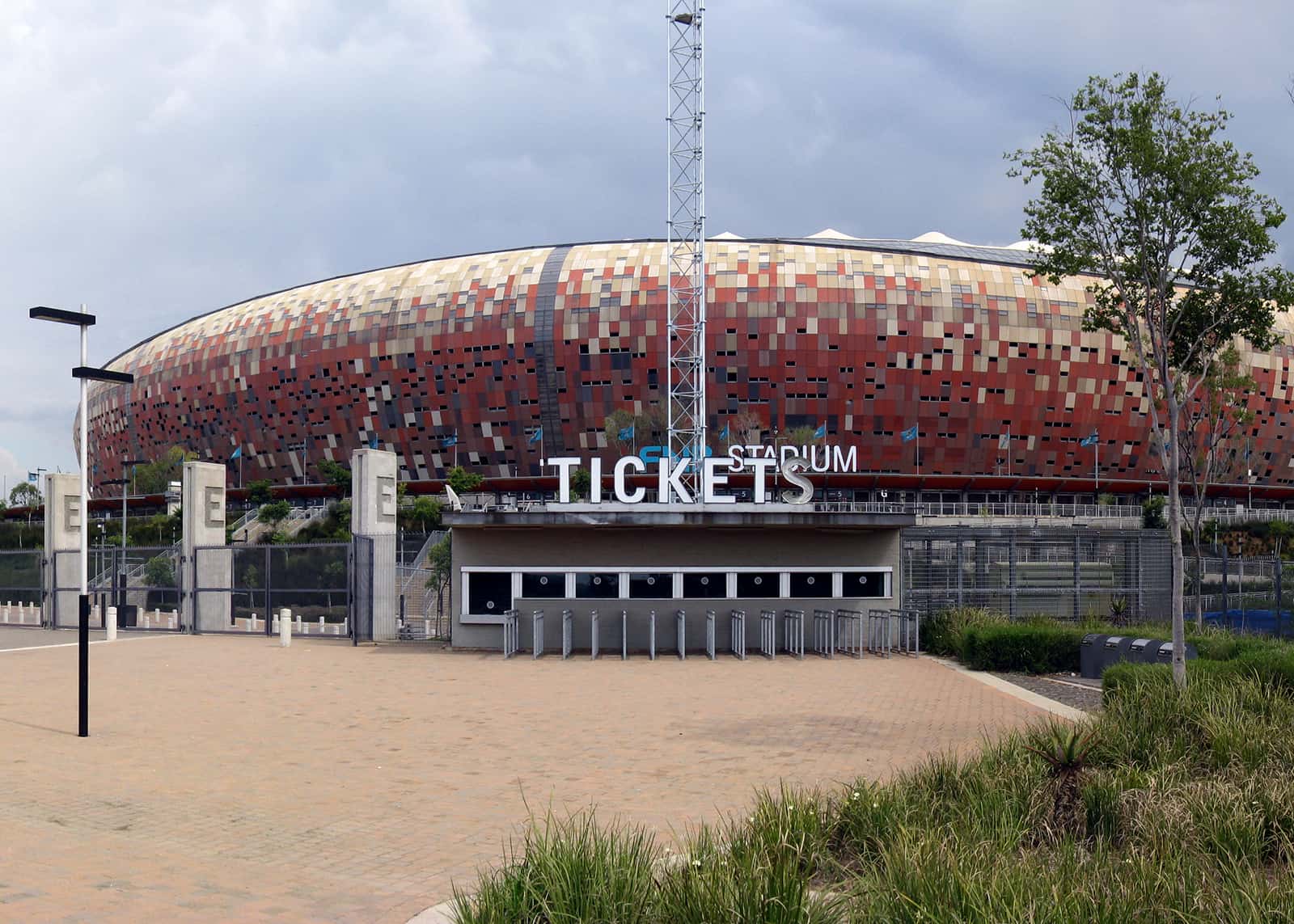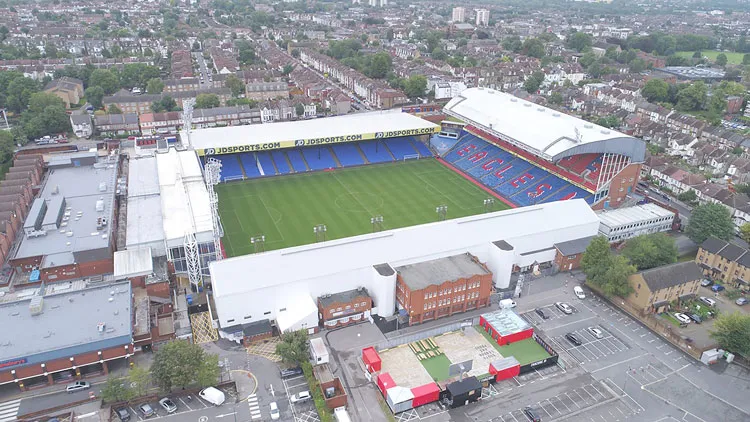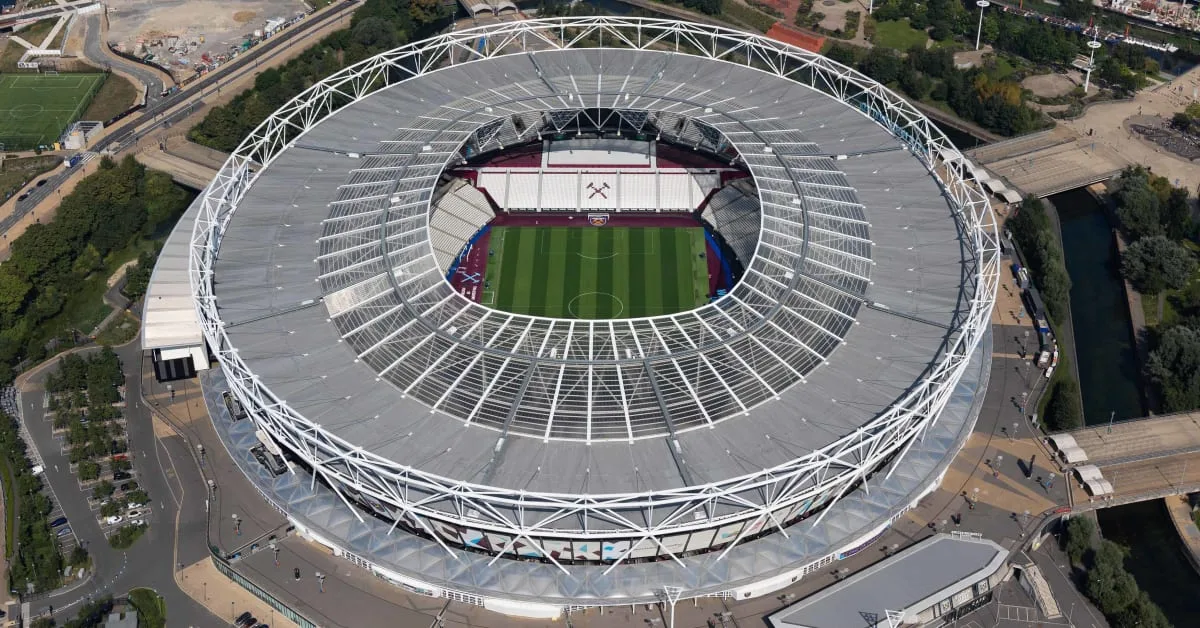FNB Stadium, also known as Soccer City or “The Calabash,” is a legendary sports and events venue located in Nasrec, bordering Soweto, Johannesburg. As the largest stadium in Africa, with a capacity of 94,736, it stands as a symbol of South Africa’s passion for football and rugby, and it’s the home of Kaizer Chiefs F.C., a leading team in the South African Premier Soccer League.
A Hub for Soccer and Rugby in South Africa
FNB Stadium is managed by Stadium Management South Africa (SMSA) and frequently hosts key fixtures for the South African national football team. It is also the venue for major rugby union matches, making it a versatile ground for sports enthusiasts. Located next to the South African Football Association headquarters, this stadium has become a central hub for South African sports.
FNB Stadium has been the stage for some of the most memorable events in South Africa’s history. It hosted the opening and closing ceremonies, as well as the final match, of the 2010 FIFA World Cup™, a milestone event that united the nation and drew global attention. In 2013, the stadium was the site of the Africa Cup of Nations final, further solidifying its reputation as a premier sports venue.
Beyond football, FNB Stadium has been the preferred stage for domestic and international rugby tests, with record crowds flocking to see the biggest matches. The Soweto Derby, featuring South Africa’s Premier Soccer League giants Kaizer Chiefs and Orlando Pirates, consistently fills the stadium to capacity, showcasing the passion and rivalry of local football.
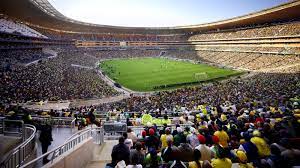
The “Calabash”: A Unique Design for the 2010 World Cup
FNB Stadium, affectionately known as the “Calabash” or “African Pot” due to its unique design, underwent a massive reconstruction costing R3.3 billion in preparation for the first-ever African-hosted World Cup in 2010. Previously known as Soccer City, its redesign drew international acclaim, showcasing a blend of modern architecture and African cultural elements.
During the World Cup, the stadium hosted key matches, including the final between the Netherlands and Spain. The venue’s capacity was adjusted to 84,490 during the tournament due to reserved seating for the press and VIPs.
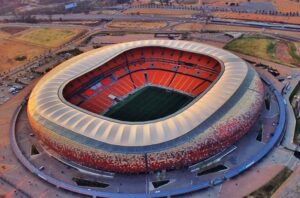
A Site of Historic Significance
FNB Stadium is steeped in history. It was the site of Nelson Mandela’s first public speech in Johannesburg after his release from prison in 1990, a moment that resonated around the world. In 2013, it also hosted Mandela’s memorial service, a moving tribute to the man who played a pivotal role in South Africa’s journey toward democracy.
The stadium has witnessed other significant events, including the funerals of anti-apartheid activists Chris Hani and Oliver Tambo in 1993, as well as the 10th-anniversary celebration of the Economic Freedom Fighters in 2023. Each of these moments has added to the legacy of this iconic venue.
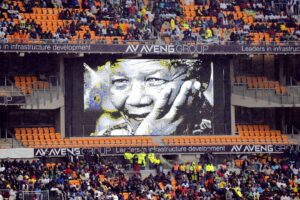
Construction and Design Highlights
Built in 1987, the stadium underwent a significant upgrade for the 2010 World Cup. The renovation was designed by HOK Sport (now Populous) and Boogertman + Partners, featuring a new encircling roof, additional executive suites, improved changing room facilities, and new floodlights. The design includes a mosaic of fiery and earthy colors on the exterior, with a ring of lights around the bottom, simulating fire under an African pot.
Inside the stadium, the stands are divided by ten black vertical lines. Nine of these lines represent the other stadiums involved in the 2010 World Cup, with a tenth line pointing toward Berlin’s Olympic Stadium, which hosted the 2006 World Cup final. This unique design element symbolizes the journey of football’s greatest tournament.
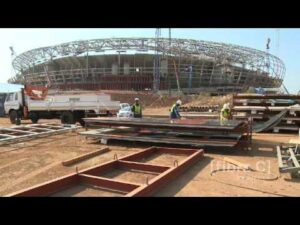
FNB Stadium: The Venue for Major Sports and Events in South Africa
FNB Stadium, located in Nasrec near Soweto, Johannesburg, is a beacon for sports and entertainment in South Africa. Known as “The Calabash” for its unique design, this stadium has hosted some of the most significant tournaments and events in the country, from football and rugby matches to major concerts and religious gatherings.
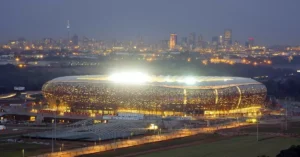
1996 African Cup of Nations: A Historic Start
FNB Stadium played a pivotal role in the 1996 African Cup of Nations, hosting the opening match, several group games, and the thrilling final where South Africa triumphed over Tunisia with a 2-0 victory. This tournament set the stage for the stadium’s reputation as a premier venue for African football. Notable games from this tournament included:
- 13 January 1996: South Africa defeated Cameroon 3-0 in the opening match.
- 27 January 1996: South Africa overcame Algeria 2-1 in the quarterfinals.
- 31 January 1996: South Africa beat Ghana 3-0 in the semifinals.
The final game saw an 80,000-strong crowd witness South Africa’s victory over Tunisia, marking a significant moment in the nation’s football history.
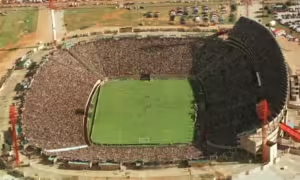
2010 FIFA World Cup: The Global Stage
The 2010 FIFA World Cup was a landmark event for FNB Stadium, which hosted the opening ceremony, the opening match between South Africa and Mexico, and the final between Spain and the Netherlands. The opening match drew an enthusiastic crowd of 84,490, while the final was watched by an equal number of fans.
- 11 June 2010: South Africa played Mexico to a 1-1 draw in the opening match.
- 11 July 2010: Spain defeated the Netherlands 1-0 after extra time to win the World Cup.
The tournament saw some unforgettable matches, such as Uruguay’s controversial penalty shootout victory over Ghana in the quarterfinals, where Luis Suárez’s infamous handball denied Ghana a historic semifinal spot.
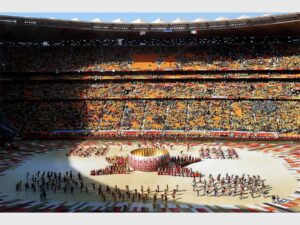
2013 African Cup of Nations: A New Chapter
FNB Stadium was once again in the spotlight for the 2013 African Cup of Nations, hosting the opening match, one group game, and the final. The opening match drew 50,000 fans as South Africa and Cape Verde ended in a goalless draw. The final, with an attendance of 85,000, saw Nigeria clinch the title with a 1-0 win over Burkina Faso.
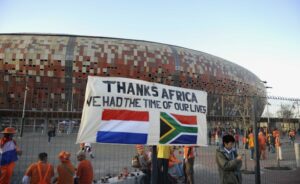
International Football and Rugby: A Multi-Purpose Venue
FNB Stadium has long been a home for Bafana Bafana, the South African national football team. It has hosted key matches and tournaments, including the 1995 Simba Four Nations Cup and the 1996 CAF Super Cup. The stadium has witnessed memorable Bafana Bafana matches, like the narrow 3-2 loss to Brazil in 1996 and the 1-0 win over Spain in 2013.
The stadium is also renowned for its rugby events. The first rugby union match was held in 2010, with a record attendance of 94,713 for a Tri Nations match between South Africa and New Zealand. The stadium has since hosted Rugby Championship games, including the Springboks’ victory over Argentina in 2013.
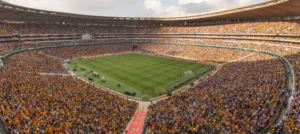
Concerts and Cultural Events: A Venue for Entertainment
FNB Stadium has attracted some of the biggest names in music, hosting U2, Lady Gaga, Justin Bieber, and Coldplay, among others. The venue has also been a site for significant religious gatherings, like Pastor Chris Oyakhilome’s “Night of Bliss,” which drew over 100,000 attendees in 2011.
Despite its popularity, the stadium has faced tragic incidents. In 2017, two people died, and 17 were injured in a crush while entering the stadium for a match between Kaizer Chiefs and Orlando Pirates. The stadium also hosted the 10th anniversary rally of the Economic Freedom Fighters in 2023, where a controversial song and a supporter’s death sparked controversy.
FNB Stadium continues to be a central location for sports, entertainment, and cultural events, symbolizing South Africa’s rich history and vibrant future.
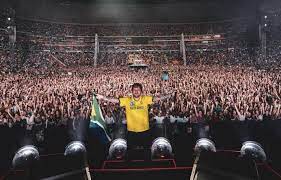
Directions to Soccer City
Soccer City, also known as FNB Stadium, is located on the southwestern edge of Johannesburg, near the city of Soweto. It is approximately 8 kilometers from Johannesburg’s Central Business District and about 9 kilometers from the center of Soweto.
From the N1 Motorway:
- Take Exit 67 for Randskouweg.
- Turn east onto Rand Show Road.
- Continue to the T-junction with Nasrec Road.
- Turn left onto Nasrec Road, and the stadium will be on your left.
From the M1 Motorway:
- Take the exit for Nasrec Road (Expo Centre).
- Turn right at the junction with Nasrec Road.
- Follow Nasrec Road until you see the stadium on your left.
Address:
Gate 2, Nasrec & Rand Show Road, Johannesburg
Kaizer Chiefs Tickets
You can purchase tickets to Kaizer Chiefs matches through several options. Online sales are available via Computicket, or you can buy tickets in person at MoneyMarket counters in any Shoprite or Checkers store. Alternatively, tickets are available at the stadium’s box office on match days.
Tickets for all stands typically cost R40.00.
Soccer City Stadium Tours
Stadium Management SA, the organization responsible for managing FNB Stadium, offers guided tours through Soccer City. The tour includes a visit to the changing rooms, players’ tunnel, mixed zone, and VIP areas. Tours last between 60 and 90 minutes.
Stadium tours are available seven days a week at various times, except on matchdays. Bookings aren’t required, but tours are subject to availability. To guarantee your spot, you can book online, call +27 (0) 11 247 5300, or email functions@stadiummanagement.co.za.
The cost for the tour is R60.00.
Other Stadiums Articles:
Also Check: The Story of the Vitality Stadium “Dean Court”: Where Bournemouth’s Heart Beats
Also Check: Victories and Evolution in English Football: Recently opened Stadiums (since 2020)
Also Check: Emirates Stadium (Home of Arsenal): A Journey Through History
Also Check: Goodison Park Stadium (Home of the Blues “Everton FC”): A Pioneering History
Also Check: Old Trafford: The Iconic Theater of Dreams
